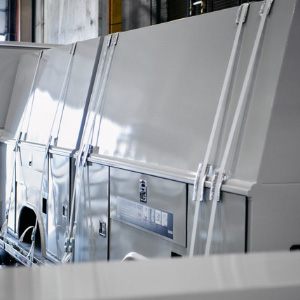Your work truck was manufactured to withstand the elements and resist the challenges of your jobsite. It’s gotten you from one place to the next while hauling various loads to keep you productive. Today, technology and engineering advancements make vehicles less prone to rusting — but even the best solutions can’t shield your truck from rust completely.
Reading Truck Body will show you how to prevent your truck from rusting via several anti-rust maintenance tips. If you want to reduce the chances of corrosion forming on your truck, you need to implement the proper defensive measures.
What Causes Trucks to Rust?
Depending on your make and model of truck, it can be constructed of different metal compared to other brands. For example, ferrous vs. non-ferrous metals determine whether your truck will be affected by rust. Ferrous metal, such as steel and cast iron, contains iron. Non-ferrous metal, like aluminum, does not.
Surface rust comes from a combination of iron oxide and water. Exposure to these elements can negatively affect your truck by damaging the engine and exterior components. Rust can eat away at the metal and spread to other areas, minimizing the structural integrity of your truck’s support system.
Road conditions often contribute to the start of corrosion because your undercarriage, tires and body components are exposed to debris, pebbles and rocks. Rubble kicked from your tires and passing cars can create openings in your vehicle’s paint. From there, the openings will allow road salt and moisture to reach the iron surface, causing rust.
Salt is the one element that accelerates the oxidation process, whether it comes from roads during winter, the beach or other locations. According to AAA, U.S. drivers pay about $3 billion each year in rust repairs. They advise people in snow- and ice-prone areas to prevent rust damage from reaching their vehicle’s fuel tanks, brake lines, exhaust systems and other vital components.
Which Areas of a Work Truck Are Most Susceptible to Rust?
Certain parts of your utility truck are more prone to rust than others because they are more exposed to the elements. These sections receive the most harm:
- Bed
- Cab corners and floors
- Exhaust
- Fenders
- Frame
- Rocker panels
- Wheel wells
It’s challenging to remove rust once it starts forming, so prevention is the best thing you can do. Rust often develops without any warning. It starts when bubbles form below your truck’s paint surface, which indicates moisture is underneath. You can check your vehicle’s paint by using a flashlight and searching for bumps, bubbles and dark spots, as well as nicks and scratches that can lead to more damage.
Flaking is the next phase. When your paint begins to chip off, the oxidation process has started. Inspect the doors, rockers and the bed of the truck for worn paint.
In areas like the undercarriage, rust may be more visible. The best way to reach your undercarriage is by placing your vehicle on jack stands. The sooner you detect rust, the faster you can prevent it from spreading.
Service Truck Rust Prevention Tips
There are various tips on how to prevent rust on a service truck. If you want to retain the strength of your vehicle’s body and components for as long as possible, it will need proactive and proper upkeep. Although you can’t stop rust once it starts, you can control the early stages of corrosion before it eats away at your entire vehicle.
1. Clean Your Truck
Keep your work truck clean like you would with your regular car. It’s particularly important if you work in areas that have high levels of dirt, sand, gravel, water and other harmful components. Washing gets rid of the contaminants and gives you time to look for scratches. Make sure to clean the body, undercarriage, wheel wells and other vulnerable zones.
2. Store It Indoors
When possible, park your truck in an enclosed area that’s temperature-regulated, like a garage, shed or barn. The right coverage protects it from the rain, sun, snow, ice and salt. Leaving your vehicle outside can weaken the protective paint layer and put your truck at risk for corrosion.
You will also want to keep your truck stowed away during winter if your industry work allows. The short-term storage will keep you away from road salt and salt brine.
3. Avoid Puddles
Puddles can contain dirt, soil, salt and a lot of sludge that you don’t want splashing under your truck. Driving through water will increase your risk of a rusty vehicle.
4. Clear the Drain Plugs
Drain plugs collect debris and water around your trunk, hood and bottom of the doors. Make sure they are clear to avoid a buildup of moisture.
5. Make Repairs
As soon as you see damages on the body of your truck, make fast repairs to inhibit more severe outcomes. Touch up the paint when necessary, too.
6. Apply an Undercoating
Many manufacturers already add a protective layer of sealant on the undercarriage of vehicles because it’s the most susceptible region to rust. Various sealants and processes can help to safeguard your unit from corrosion. You can also choose to perform your own undercoating to keep your truck in optimal condition.
Even applying an undercoating to the vehicle’s paint can deter damage. Clean the surface before spraying to ensure no moisture is present. Then, you can add more protection with an anti-rust spray.
Preventive treatment is your best bet in increasing the longevity of your work truck. Instead of waiting until rust begins to take over, the right measurements can help you avoid damage and expensive repairs or replacements.
Service Bodies for Enhanced Productivity
To get your truck ready to perform in various conditions and industries, you may need a few upgrades to ensure the highest productivity levels. Reading Body offers service bodies for oil and gas, construction, landscape, HVAC, telecom and utility industries. We deliver incredible warranties and provide customized solutions that meet your precise demands. As a renowned truck equipment manufacturer in the U.S., we work with high-quality materials and precision processes to offer valuable solutions.
Reach out to our online representatives or browse our upfitting products. With preventative rust maintenance under your work belt, you can rely on our services to gain a competitive advantage in your sector.



